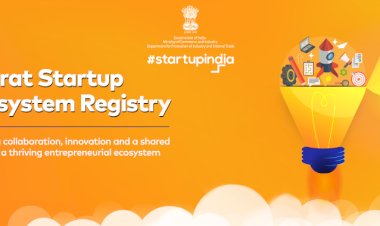Budget 2022: Progressive sops for entrepreneurs would drive India's innovation economy.
The startup community has praised Finance Minister Nirmala Sitharaman's Budget 2022 to provide broad-based support across sectors and generate new job prospects in the future. The Union Budget 2022 acknowledged the need for long-term development. To make growth more inclusive, the government has emphasized the use of technology, such as artificial intelligence.

The focus of India's annual Union Budget has been on paving the path for the economy's repair and recovery since the start of COVID-19.
The introduction of the Union Budget 2022 by Finance Minister Nirmala Sitharaman made it abundantly obvious that the focus has not strayed from the topic of rebuilding India in the post-pandemic transition. Founders and ecosystem players in India Inc. reacted positively to a variety of steps announced to keep the momentum of India's startups going.
The startup community has praised the budget for its promise to provide broad-based support across industries and create significant job prospects in the future.
The budget's relief and drive for entrepreneurs as a hint of more positive changes on the horizon. It demonstrates India's growing importance in the global innovation economy.
India's tech startups have solidified their position in the global startup ecosystem, according to recent research, by raising $42 billion in total funding volume in 2021.
Let's take a look at how the budget fits into the government's long-term strategy and dedication to fostering and strengthening India's startups.
- Extending the tax holiday for India's young entrepreneurs.
One of the budget's main highlights was the extension of tax advantages for startup companies. The government increased the tax benefits to eligible startups for another year, until March 31, 2023, in order to help this segment throughout the pandemic. If the whole annual turnover does not exceed Rs 25 crore in any financial year, such startups are eligible for a tax discount of 100 per cent on profits for three years in the first ten years after formation. Previously, startups that were formed before March 31, 2022, were eligible for the same tax break.
New firms will be able to scale quickly without being restricted by tax burdens in their early years of operation thanks to such a benefit plan.
- Minimizing the tax burden on startup investors.
The Union Budget 2022 is projected to benefit not just the startup community, but also investors. The government has placed a 15 per cent surcharge on long-term capital gains on capital assets, regardless of the number of long-term capital gains.
High-net-worth people (HNWIs) who have invested in unlisted stocks and held equity shares in startups for more than a year would be the primary beneficiaries of this programme. As a result, the gains on the sale of such shares would be long-term investment income.
The government's decision to establish an expert group to review the regulatory framework affecting the VC and private equity (PE) industries have been welcomed by venture capitalists (VCs) looking to invest in companies. This is a commendable attempt to demonstrate the government's faith in the investment community, especially at a time when India's startups are booming and garnering international prominence.
- Increasing indigenous manufacturing to achieve self-sufficiency
Another progressive step was the government's provision of a 15 per cent concessional rate for newly established domestic manufacturing enterprises registered on or before October 1, 2019, for an additional year, until March 2024. This provision is based on the Atmanirbhar Bharat ideology, which aims to transform India into a self-sufficient global superpower with superior manufacturing skills.
Furthermore, to limit arms imports and indigenize defence production, the defence budget allocates 68 per cent of capital procurements to the domestic industry. This proposal will make it easier for the government to work with defence companies that have the R&D capability to design and produce world-class military equipment.
This is an excellent example of how to create a unique public-private cooperation model. Perhaps it can be used in other industries as well.
- Innovative techniques are being used to modernise Indian agriculture.
According to the budget, a specific fund for agritech startups will be established, which will be enabled by the National Bank for Agriculture and Rural Development (NABARD). The blended capital fund will invest in startups in agriculture and rural enterprises in order to improve the farm product value chain.
The necessity of harnessing cutting-edge technologies to modernise the agriculture sector and support farmers was also emphasised in the budget. It promoted the use of drones to spray insecticides and conduct land surveys and crop assessments as part of the "Kisan Drones" programme. This is good news for drone businesses who are bringing a variety of novel agricultural solutions to market.
[To keep the agricultural ecosystem growing, disruptive agritech startups should grab these opportunities and partner with Farmer Producer Organizations (FPOs).]
- Channelling the ‘Shakti’ of India’s drone startups
Drone Shakti, India's game-changing drone plan, has sparked excitement among India's emerging drone startups. It follows the announcement in 2021 of the centre's new drone policy, which aims to democratise the drone ecosystem.
Drones-as-a-Service (DRaaS) is a positive step toward fostering innovation in India's drone industry, which is anticipated to reach $1.81 billion by 2026. With the aid of innovative entrepreneurs that employ the technology for various applications, especially at the grassroots level, the campaign will raise awareness about how drones may be used across industries.
Drone Shakti illustrates the government's long-term strategy of utilising digital technologies to fix India's long-standing problems on a large scale.
- Creating jobs in a variety of industries
The government's flagship Production Linked Incentive (PLI) scheme, according to the finance minister, has the potential to create at least 60 lakh new jobs in industries such as pharmaceuticals, medical devices, large-scale electronics manufacturing, textiles, food products, solar EV modules, and automobiles, among others. Additional manufacture of Rs 30 lakh crore worth of items are also planned over the next five years.
This programme is also in line with the government's Atmanirbhar Bharat strategy, which aims to increase domestic manufacturing. The news is encouraging for India's domestic startups and MSMEs, who are on their way to employing a large number of people as a result of their innovative activities.
- 'One product, one station' PM Gati Shakti
The epidemic has unequivocally demonstrated the need for effective, simplified logistics and strengthened logistics infrastructure in order for industry operators to ship goods without delay or harm.
The 'One station, one product' policy announced under the PM Gati Shakti plan will help to bolster the supply chain of local products by focusing on long-term sustainable improvements that will benefit the logistics industry and the entire startup ecosystem, including D2C businesses, e-Commerce/social commerce platforms, and so on. By increasing purchases from local players/producers, the country will be able to achieve its aim of becoming Aatmanirbhar Bharat.
The PM Gati Shakti plan, a game-changing strategy for long-term economic growth, will promote efficient multimodal logistics by expanding roads, railroads, airports, seaports, and canals, among other things. The above-mentioned will improve the efficiency of both people and commodities movement as part of the multi-modal logistics plan.
In addition, the concept for a redesigned unified logistics interface platform will allow for easy and safe data sharing between logistics providers as well as access to real-time data. Aggregator companies will be able to establish efficient, frictionless end-to-end logistics as a result of this infrastructure improvement.
Positivity is leading the way.
In addition, the budget gives a boost to startups in a variety of areas. For example, EV startups can rejoice since the customs tariff on lithium-ion cells will be cut, lowering the cost of car manufacture. The budget's emphasis on upskilling and digital learning will assist edtech companies as well.
I do, however, have some reservations regarding the finances. The regulations for allowing foreign direct listings remain unclear, which is a significant demand from the startup community that was not addressed in the budget.
Moreover, despite the recognition of virtual digital assets, blockchain firms and investors have been disappointed by the steep 30 per cent cryptocurrency tax.
Despite the numerous hurdles, India's growth and recovery are at the forefront of the budget. The government's quest for a digital economy based on innovation is reflected not only in its policies but also in the finance minister's presentation of a paperless budget for the second time, this time via the Union Budget Mobile app.
It remains to be seen whether India's entrepreneurs would take advantage of the budget's startup-friendly policies and grab the tremendous chances that will propel them to new heights of invention.

 Lalita Singh
Lalita Singh 





















